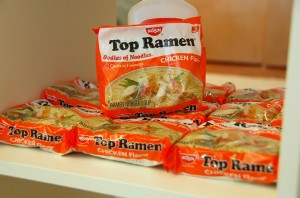
Ramen was the “in thing” in grad school. Everyone trooped to the grocery store to get some. It was unhealthy but fast, and the entire graduate office smelled like preservatives by the time we were all done with our tiny bowls of steaming noodles and soup. We also got sick from the high sodium, and from our dependence on anything but vegetables. After a week of too much ramen, I decided to go grocery shopping.
After a month of grocery shopping and a very tired bank account, I finally found out how to shop smart as a graduate student. For nearly four years, I saved a lot of money, even when I had a roommate. All it took was a lot of prudence – and avoidance of instant food.
1. Study Your Terrain: Which grocery stores sell what for cheap?
Not all grocery stores are the same. Some will sell milk for a few cents lower than another store chain. That same store chain might not have sales on bread as often as another store chain. All it takes is a bit of commuting (or driving) and a keen sense of observation.
The next time you’re in the grocery store, take down notes. Go to another grocery store and compare prices. Go to yet another grocery store. Look for news on who’s having a sale when. You deserve savings! Just make sure that the stores are close enough to each other so that you don’t have to drive all over town to get your groceries.
2. Ditch the Preservatives, Go for the Fresh
Avoid ramen, frozen pizzas, and other preservative-laden foods! Load yourself up with vitamins by buying fresh vegetables, lean meats, and unprocessed carbohydrates. While these might look expensive, you can actually get a lot of meals out of them and be filled up instantly – instead of getting the empty feeling after consuming a bowl of ramen.
You’ll also want those vitamins to keep your immune system working as you need to spend hours on research, writing, and even teaching and grading! Keep yourself out of the hospital by eating right!
3. Use Those Coupons – WITHIN REASON
I know where to get coupons, and it’s fun to search for them. They’re in the Sunday paper, the campus newspaper, magazines, even next to the restaurant cashier.
However, I don’t have to use all the coupons I find. I really don’t need five boxes of mozzarella sticks at 50 cents each, so out goes that coupon. However, I do need me a lot of toilet paper, so yes, I’ll take that coupon, thank you.
There’s no shame in saving money and clipping coupons. There will be shame, however, in not being able to pay off my credit card or not having enough money to get myself a decent meal.
4. Buy Toiletries and Housekeeping Stuff in Bulk
My friends often buy everything in bulk. Hence, too many chickens, too many cans of peas, and way too many bags of sugar. I can only eat so much, but I do use a lot of detergent, toothpaste, and shampoo.
Toiletries and housekeeping stuff are safe to buy in bulk. They’ll definitely be used, they won’t expire, and you’ll definitely need them. But you won’t always eat chicken, you can only take so much pea soup, and you won’t bake until the cows come home. Limit your bulk purchases and you’ll actually save money.
5. Eat Before Leaving the House
This is a tip that every person should follow, graduate student or not. Shopping on an empty stomach can result in making impulse buys. Common sense should tell you that you should eat if you tend to shop like mad on an empty stomach. This can help you break bad shopping habits.
6. Avoid Using Your Credit Card
I’ve found that if I limit my cash and keep my credit card at home, I tend to make smarter purchases. A credit card can foster bad spending habits if you don’t take care of your savings.
A single swipe doesn’t feel like anything at all, but you’re accumulating debt. On the other hand, your thinning, lightening wallet feels pretty darn awful…
So make smart purchases by knowing what to purchase things with. If you must use your credit card, use it for bigger, more expensive purchases. You’ll still want to have a good credit score, but you also don’t want to drag yourself into debt.
7. Buy to Make a Stew
Or, more precisely: buy food to make a complete meal in one bowl. I used to get carrots, potatoes, green beans, tomato sauce, chicken broth, stewing beef, garlic, and onions. I’d simmer everything together for a soup that was hearty as it was filling. I had all the vitamins I wanted. I simply had to leave it on the stove while I sat close by, finishing my paper.
My total spending for that shopping spree of sorts? With thanks to coupons, and a single grocery store that had all the things I needed, I spent a total of around $22. I had stew for around 8 meals that winter week. It was good, I was always full, and I wasn’t getting sick – all for less than $3 a meal.
Being a graduate student might be difficult, but if you shop smart, you’ll make it through your program healthy and smiling. Know where to spend and how to save your money, and you’ll survive – with a degree, to boot.
About the Author: Inez Ponce de Leon now has a PhD, but she still loves to look back on her grad school days and give advice to young scholars. She works in both a non-profit and the academe and does a lot of writing on the side. Her interests are diverse, so she writes on topics as wide as belly dancing, procera avh, racism in Philippine football, and sociological theories.
Editors Note: We welcome submissions of appropriate articles for our readers. Inclusion of a guest post on this blog does not imply endorsement of the contents of linked pages, nor of the organization supplying the article. We do however support and appreciate the value of the information contained in the article for the benefit of our readers.
If you’re struggling to pay off debt, ACCC can help. Schedule a free credit counseling session with us today.






